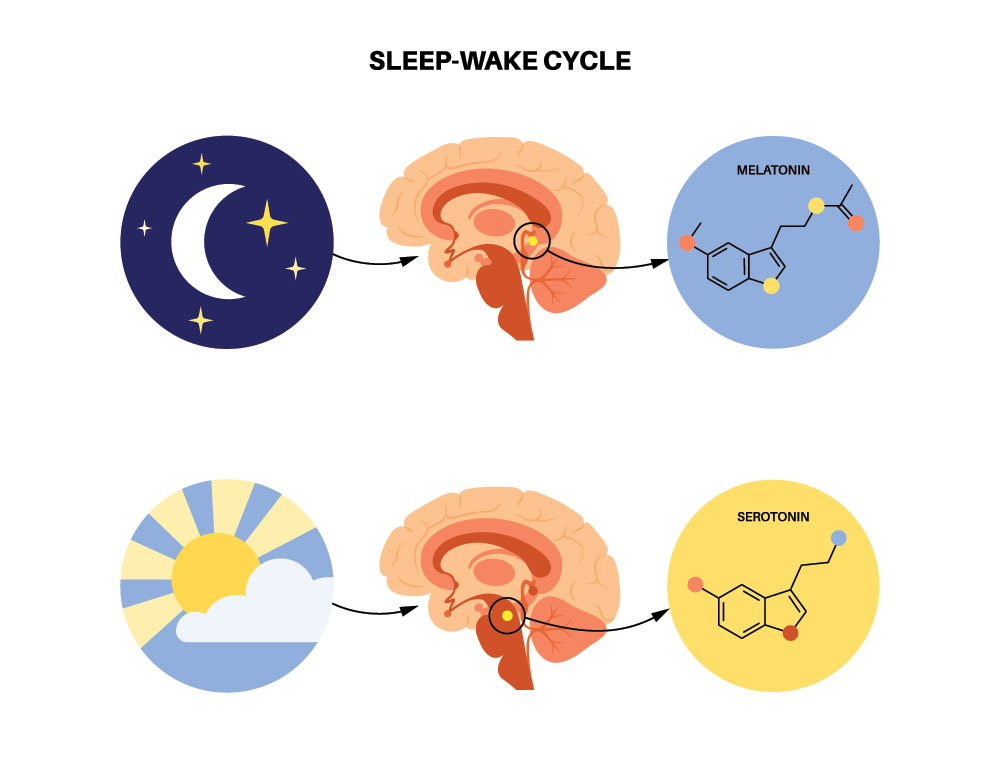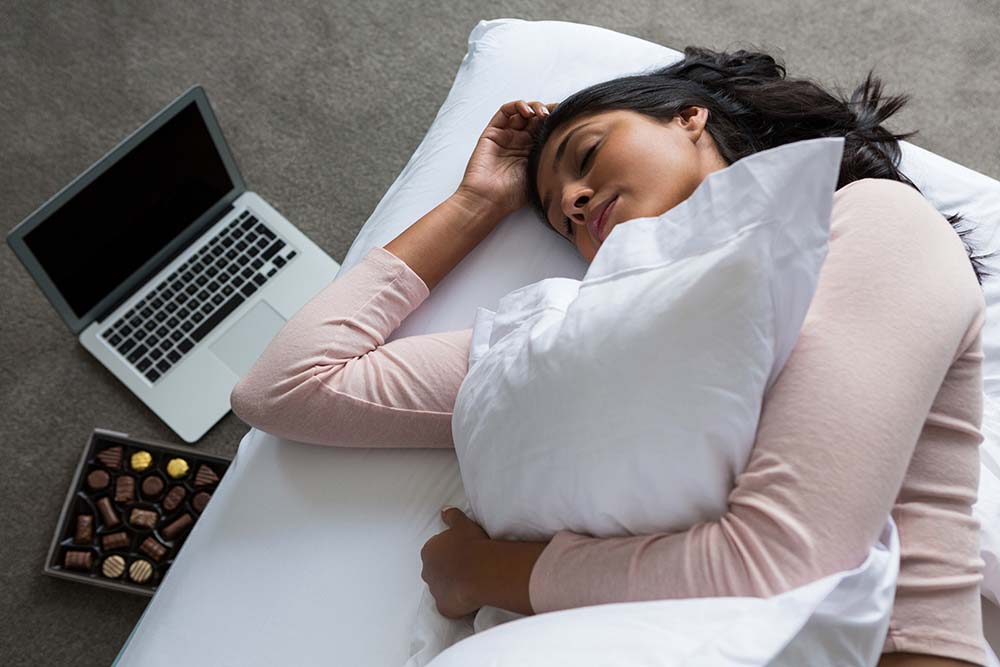Is your new year 2023 resolution all about getting your health back on track so you can function at your best? If it is, then here’s something you should know: Following a healthy and trendy balanced diet, getting plenty of fresh air and exercise, and focusing on your mental wellbeing are all important. But none of these will make the impact you need unless you fix your sleep cycle.
Your sleep cycle, also known as the sleep-wake cycle, is based on the circadian rhythm of the body. All living things adhere to this circadian rhythm, which is in turn based on day and night—which is why most living things stay awake during the day and fall asleep during the night. The problem is that humans today have overcome the natural barriers presented by sunlight and its lack. With electric lights, digital devices and an explosion of content to be consumed, most of us now tend to stay awake at night.
Impact Of Your Sleep Cycle On Health
What this effectively does is disrupt the natural sleep cycle. The impacts of this disruption may seem negligible in the beginning, but science proves that the long-term effect on our biological, psychological and physiological health can be very debilitating indeed. The American Sleep Foundation says that an average adult needs seven to nine hours of sleep every night, but women actually need it a bit more.
This is because our sleep-wake cycle is determined by the production of hormones like serotonin and melatonin. In the case of women, hormonal changes happen monthly due to menstruation. This apart, women also go through pregnancy, menopause and many stress-, age- or reproductive health-related issues that have an impact on our hormones. Women, therefore, need to be even more cautious about maintaining their sleep cycle.
As mentioned before, this is precisely the reason why if your resolution in 2023 is to improve your overall health, then at least a part of your focus should be on fixing your sleep cycle.

A Matter Of Routine
The first step you need to take to fix your sleep cycle is to accept the fact that the key problem in your life is either a routine that is unhealthy or a complete lack of a routine. Human beings, no matter what our gender or background, are creatures of habit. From the time we are born, our body adapts to a certain clock based on patterns of regular behaviour. When we are kids, our behaviour and routine are determined by our parents, who ensure that we get regular nutrition, exercise and sleep. This is why you’d find most kids up by six or seven every day to get ready for school, and in bed by nine or ten at night—apart from any compulsory nap times enforced by families.
As we reach adulthood and take control of our own habits, this routine often gets skewed. You might think it’s an exam, an interview, a deadline or a party keeping you awake, but the gross impact is that your sleep cycle is disrupted and habits you’ve developed throughout a lifetime are broken. To get the sleep cycle back on track would mean a reassertion of the importance of routine. You will have to dedicate yourself to creating a healthy routine that doesn’t just involve the night-time when you sleep, but also waking hours during the day. You will have to reset your entire circadian rhythm, synchronise your internal and external clocks, and then move forward.
Beware, The Sleep Routine Disruptors!
To fix your sleep cycle, you must identify the things that have sent your routine out of whack. Once you identify the culprits, you can target each challenge head-on and first fix them to fix your sleep cycle. Here are some common sleep routine disruptors you should look out for, according to the American Sleep Foundation.
• Artificial light exposure: This one’s a major culprit since our lives are now surrounded completely by artificial light. Whether it’s that LED light in your room or the blue light emanating from your mobile, tablet, laptop or smart TV, the brain responds to it just as much as it does naturally to daylight. Due to this constant exposure to artificial light, your brain never generates the natural sleep signals associated with night-time, thereby extending your waking hours beyond capacity. The result is that you not only get less sleep, but it is often disturbed, and low in quality, leading to feelings of grogginess and lethargy during the next day.
• Fluctuating sleep hours: Most people, and we mean adults here, have no set bedtime or wake-up time—and further, we’re all very handy with the snooze button even if we do set an alarm. The result is that we often end up getting little sleep during the weekdays, and end up incurring a huge sleep debt. Sure, we try to make up for the debt during the weekends or holidays, but without a set routine, the body and mind never completely recovers. Ultimately, what you have is a messed up sleep schedule which increases your feelings of general lethargy, burnout and behaviours like eating unhealthy, irritability, anger, etc.
• Stress & mental health: Stress, anxiety, depression and other emotional or mental health issues are increasingly a major cause of sleep disruption these days. Most of these issues impact the hormones, which leads to a disrupted circadian rhythm. People with these issues also often tend to develop insomnia or feel excessively sleepy during the day. Sleep terrors and nightmares can also develop in extreme cases. This sleep disruptor has far-reaching impacts, so if you are going through something like this, seeing a mental health professional is recommended immediately.
• Lifestyle choices: There are problems that are beyond our control, and then there are problems we choose to create. When it comes to your sleep cycle, the lifestyle choices we make can have huge impacts. Whether it’s regular late-night parties or binge-watching, or it’s a bad diet consisting of heavy foods, junk foods, caffeine, energy drinks or alcohol consumed before bedtime, every bad lifestyle choice you make delays your sleep time and negatively impacts your sleep cycle.
• Other issues: Apart from the disruptors mentioned above, jet lag and shift work can also throw your sleep cycle off its routine. Travelling across time zones disrupts the body’s internal clock, and you need a new sleep routine to help your body adjust. If you work the night shift, however, then your circadian rhythm isn’t just disrupted, rather it’s turned completely upside down. The day-night system doesn’t apply here, which is why your body clock is likely to be completely out of whack.

Steps To Fix Your Sleep Cycle
Now that you know what the major sleep disruptors are, here are the steps you need to take according to the Mayo Clinic, to fix your sleep cycle.
1. Maintain a sleep schedule: You need to fix a bedtime and a wake-up time—without the weekend exception because consistency is everything that matters here—and stick to it all year through. Make sure you get eight hours of sleep every day and fall asleep within 20 minutes of hitting the bed.
2. Create a restful bedroom environment: Your body and brain get signals from every stimulus around you, so the place where you sleep needs to send the right ones. Your bedroom must be a cool, dark and quiet space, and digital devices or even televisions shouldn’t be there because they will inevitably keep you awake.
3. Adopt relaxation techniques: If you find getting your mind to a restful one a big task, then you can adopt a number of relaxation techniques. Meditating before sleep is a good one, and so is taking a warm bath. Soothing music also helps.
4. Take care of what you consume: Consumption of nicotine, caffeine, alcohol and heavy or rich foods before bedtime is a big no-no. You might assume that alcohol helps sleep, but the fact is this sleep is never complete or relaxing. The same applies to that cup of coffee and energy drinks. Heavy foods on the other hand lead to stomach discomfort, which is known to disrupt sleep. So, eat a light and healthy dinner at least an hour before bedtime.
5. Don’t nap: Daytime napping may be enjoyable, and even necessary when you’re a kid, but as adults, you need to limit your naptime as much as possible. Long daytime naps can disrupt your night-time sleep schedule.
6. Get exercise: Believe it or not, getting regular physical exercise, improves your health and promotes better sleep. Exercise releases the best hormones in the body, which also helps maintain the hormonal balance you need to get good sleep.
7. Handle stress: Stress management through meditation, therapy, journaling and other methods is a good idea. These techniques can help you get rid of daily stresses before bedtime, thereby ensuring that you get a good night’s sleep.
8. Contact a sleep specialist: Knowing when to ask for help is a key factor in getting your life back in order. There are many sleep issues like insomnia and night terrors which cannot be handled without appropriate professional help and treatment. If you feel your sleep issues cannot be resolved by any other methods given here, then contact your healthcare provider or reach out to Her Circle’s experts through the Help section.